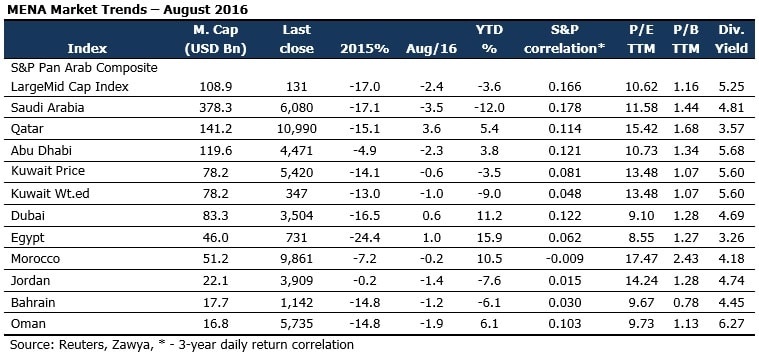
Blue Chips were mixed in August with DP World and Ooredoo gaining 8.8 percent and 8.1 percent respectively. Four of the top five gainers were from Qatar, with Qatar National Bank and Industries Qatar share prices up by 7.5 percent and 6.1 percent respectively. Investors flooded their investments into Qatari large caps after the announcement of FTSE to include them into the emerging markets index on 24th August 2016. Saudi stocks were at the bottom, National commercial bank (NCB) and Saudi Telecom (STC) plummeted by 8 percent and 6.5 percent in August. Saudi Telecom Corporation’s profit for H1 2016 declined by 16percent YoY adding to the adverse sentiments attached to the Saudi stocks. Plans of Saudi Telecom to start its fourth generation mobile phone services in Egypt that was expected to give a boost to its revenue failed to materialize last month. With declining oil income, banks in Saudi Arabia are facing tightened liquidity position. Government deposits are expected to decline and banks have started to raise capital through bond issuances to manage their finances. All these factors reflect in the 8 percent decline in stock prices of the largest lender in the kingdom, NCB.
Saudi Arabia to encourage foreign investors
Saudi Arabia announced that it would liberalize restrictions on foreign investment in its securities markets on 4th Sep, sooner than previously indicated, in an effort to attract more institutional money into its bourse. When Riyadh opened its bourse to direct foreign investment in June 2015, it took a careful approach, imposing tight ownership limits and minimum qualifications for overseas institutions to reduce the risk of sudden changes in market dynamics. All types of foreign investors still own only 1.03 percent of the $390 billion market (Reuters).
Reforms in the stock market are in line with the country’s vision to reduce their dependence on oil. One major step in the direction is Saudi Aramco’s IPO, whose value is estimated to be anywhere from $2 trillion to $10 trillion. It would become difficult for the Saudi market to absorb the offer if foreign investments are highly restricted. Ambitious plans of the government depends on the success of the Saudi Aramco IPO, for which a foreign investor friendly market becomes a pre-requisite. Easing regulations for foreign investments can also be seen as a step towards Saudi’s inclusion into MSCI emerging market inclusion.
Oil Market Review
Brent crude entered into the bull market in the month of August with the hopes of a supply freeze early in September. Investors turned positive and the oil jumped 10.7 percent after the Saudi oil minister said that they would take action on the oversupply that flooded the market earlier. Uncertainties persist about the oil supply and prices in the coming months. Analysts claim that the oil rally might be short lived if OPEC and non-OPEC members fail to come to a consensus on supply freeze.
Despite relief in August, the threat oil faces is multi-pronged; rising inventories in the US, the myth of undisclosed oil stored in the Chinese islands, the consensus of talks between the oil producing countries and the resurgence of dollar that would further weaken the oil price. An increase in the US interest rates will strengthen the dollar, posing a threat to oil. Uncertainties apart, August provided a sigh of relief for the oil market.
Stay Tuned To Marmore MENA Insights!
Never miss a patch or an update with Marmore's Newsletter. Subscribe now!
Related Article
2024 Kuwait Banking: Interest Rates and NIM Trend Analysis
The blog discusses how net interest margin of Kuwaits banks has moved across interest rate cycles, in light of awaited policy rate cuts.
Read MoreAre ESG and Sustainable investing the same?
ESG and Sustainable Investing might seem to be related but both are distinct concepts. The GCC nations transition towards cleaner energy portrays a buoyant outlook for ESG and sustainable investing.
Read MoreBusiness Impact of IFRS Sustainability Standards for GCC
The impact of the recently issued IFRS sustainability standards, once adopted, is likely to be high, as GCC companies scramble to allocate adequate resources for the adoption.
Read More




